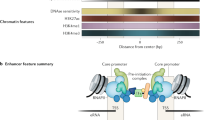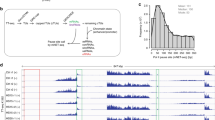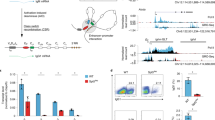Abstract
Enhancers increase the frequency of transcription initiation from linked promoter elements1, most probably as a result of the binding of specific proteins to the enhancer. The polyomavirus early region is expressed in differentiated mouse cells but not in undifferentiated embryonal carcinoma (EC) cells2,3. This host range is a function of the enhancer because polyomavirus mutants selected for growth in EC cells have mutations in the enhancer4–6 and the host range is reproduced in transfection assays using the mutant enhancers7. To understand the basis for this alteration in enhancer function, we have assayed extracts of EC cells for proteins that can interact with this sequence. We have detected a protein, present in a variety of cells, that can bind to the F441 mutant sequence, but binds only very poorly to the wild-type sequence. We conclude that this sequence alteration has probably generated a binding site for a positive-acting factor that allows the enhancer to function.
This is a preview of subscription content, access via your institution
Access options
Subscribe to this journal
Receive 51 print issues and online access
$199.00 per year
only $3.90 per issue
Buy this article
- Purchase on Springer Link
- Instant access to full article PDF
Prices may be subject to local taxes which are calculated during checkout
Similar content being viewed by others
References
1. Serfling, E., Jasin, M. & Schaffner, W. Trends Genet. 1, 224–230 (1985). 2. Swartzendruber, D. E. & Lehman, J. M. J. cell Physiol. 85, 179–188 (1975). 3. Boccara, M. & Kelly, F. Virology 90, 147–150 (1978). 4. Katinka, M., Yaniv, M., Vasseur, M. & Blangy, D. Cell 20, 393–399 (1980). 5. Fujimura, F. K., Deininger, P. L., Friedmann, T. & Linney, E. Cell 23, 809–814 (1981). 6. Sekikawa, K. & Levine, A. J. Proc. natn. Acad. Sci. US.A. 78, 1100–1104 (1981). 7. Linney, E. & Donerly, S. Cell 35, 693–699 (1983). 8. Herbomel, P., Bourachot, B. & Yaniv, M. Cell 39, 653–662 (1984). 9. Garner, M. M. & Revzin, A. Nucleic. Acids Res. 9, 3047–3060 (1981). 10. Fried, M. & Crothers, D. M. Nucleic Acids Res. 9, 6506–6525 (1981). 11. Gidoni, D., Dynan, W. S. & Tjian, R. Nature 312, 409–413 (1984). 12. German, C. M., Rigby, P. W. J. & Lane, D. P. Cell 42, 519–526 (1985). 13. Borrelli, E., Hen, R. & Chambon, P. Nature 312, 608–612 (1984). 14. Imperiale, M. J., Kao, H.–T., Feldman, L. T., Nevins, J. R. & Strickland, S. Molec. cell. Biol. 4, 867–874 (1984). 15. Hen, R., Borrelli, E., Fromental, C., Sassone–Corsi, P. & Chambon, P. Nature 321, 249–251 (1986). 16. Piette, J., Kryszke, M.–H. & Yaniv, M. EMBO J. 4, 2675–2685 (1985). 17. Fujimura, F. K. Nucleic. Acids Res. 14, 2845–2861 (1986). 18. Bohnlein, E. & Gruss, P. Molec. cell. Biol. 6, 1401–1411 (1986). 19. Weiher, H. & Botchan, M. R. Nucleic Acids Res. 12, 2901–2916 (1984). 20. Kovesdi, I., Reichel, R. & Nevins, J. R. Cell 45, 219–228 (1986). 21. Dignam, J. D., Lebovitz, R. M. & Roeder, R. G. Nucleic Acids Res. 11, 1475–1489 (1983). 22. Galas, D. & Schmitz, A. Nucleic Acids Res. 5, 3157–3170 (1978). 23. Sen, R. & Baltimore, D. Cell 46, 705–716 (1986). 24. Deschatreete, J., Moore, E. E., Dubois, M. & Weiss, M. C. Cell 19, 1043–1051 (1980). 25. Strickland, S. & Mahdavi, V. Cell 15, 393–403 (1978).
Author information
Authors and Affiliations
Rights and permissions
About this article
Cite this article
Kovesdi, I., Satake, M., Furukawa, K. et al. A factor discriminating between the wildtype and a mutant polyomavirus enhancer. Nature 328, 87–89 (1987). https://doi.org/10.1038/328087a0
Received:
Accepted:
Issue Date:
DOI: https://doi.org/10.1038/328087a0
Comments
By submitting a comment you agree to abide by our Terms and Community Guidelines. If you find something abusive or that does not comply with our terms or guidelines please flag it as inappropriate.



